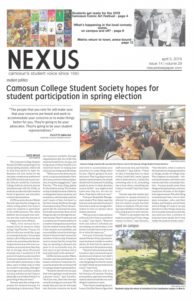Coffee—ah, that all-powerful six-letter word. What sort of thoughts does that word conjure? Maybe you’re an avid coffee drinker, maybe you engage with it a bit, or maybe you don’t drink it at all. Regardless, it’s still one of the most talked-about beverages for students. After all, what other legal substance can keep you going at 2 am when you’re cramming the night before an exam? However, take caution the next time you reach for that all-too-familiar cuppa joe (or energy drink).
Students nowadays promiscuously drink large amounts of coffee without thinking of the negative side effects, and are most often oblivious to what lurks in a seemingly innocent beverage. For one, according to some studies, caffeine can contribute to anxiety and insomnia. It’s well known that being caffeinated makes someone more alert—this works by releasing adrenaline, which induces a feeling of being on edge.
This is more troublesome when consuming higher doses of caffeine, as this can make you noticeably jittery and can actually make you more stressed. Just as it can contribute to anxiety, it can also inhibit sleep and lead to insomnia.
Sure, that’s one of its infamous qualities, but it can hinder sleep even if you don’t want it to. Did you know that caffeine stays in your system for four to six hours? That’s why it’s very important to pay attention not only to the amount of coffee you consume, but also to when you consume it.
Caffeine intake of 329 milligrams a day (the equivalent of around three cups of coffee) has also been linked to a higher urinary frequency, as it stimulates your bladder. It’s actually 70 percent more likely that you’ll develop incontinence due to what we view as an innocent beverage. This isn’t as severe as the other side effects I mentioned, but it’s still an unwanted outcome of drinking coffee.
Caffeine can also be very addictive—studies have shown that caffeine triggers the same part of the brain as cocaine, but attacks it differently. Coffee can make you psychologically or physically dependent and cause you to crave it constantly. Do ever feel that urge to dwell deep in the waters of this euphoric drink? You may develop some sort of addiction if you consume it regularly.
However, coffee can also have positive side effects, such as improving energy levels. Also, it contains essential nutrients like riboflavin (vitamin B2), and it can protect you from Alzheimer’s disease.
Still, despite all these positive benefits, caffeine can do more damage than good if you’re not aware of the amount you consume and when you consume it.
So next time you reach, with an immense urge, for that good ol’ mug of joe (or energy drink!), think twice, and remember to tread cautiously.

